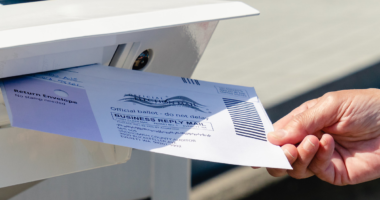Anyone who witnessed my joyous reaction when hearing my daughter had bagged her first job would have assumed it was I who got the gig.
The call from my 16-year-old telling me, ‘I’ve got it mum,’ had followed a summer spent applying to almost every retailer and cafe within a three-mile radius of the Hertfordshire market town of Bishop’s Stortford where we live.
I was happy and relieved, but as well as having extra cash I hoped she’d experience some of the excitement my own first job had brought me a few decades before.
My Saturday job at Marks and Spencer taught life lessons, such as managing a bank account for the first time and seeing my hard work become real things, like the Chelsea Girl red and black striped sweater dress I spent my first wages on.
After the initial excitement, Imogen soon settled into a routine.
She is working 12 hours a week at a large supermarket, split over three days, a few minutes’ walk from home.
It works around her A-levels, as she’s just started Year 12.
The Sunday before half term – her second week into the job – Imogen, her younger sister Isabella, 12, and I debated whether we could, or should, get a takeaway. My husband, their dad, Andrew had gone away that weekend and Isabella’s netball matches, Imogen’s Duke of Edinburgh volunteering, plus long walks with one of our beagles, Charli, as well as the usual housework and the ‘washing monster’ had left little time for a food shop.

Samantha’s daughter Imogen works alongside studying for A-levels
I headed to the kitchen to work out what I could make to convince my girls a ‘fakeaway’ was a better option than a £30-plus delivery.
Imogen followed me into the kitchen. As I opened the freezer she said: ‘I can buy it, Mum.’
Now it isn’t unusual for Immy to offer to pay for things, but they are normally things she wants, such as computer games or sweets.
This was the first time she had offered to pay for something others would benefit from.
Naturally, I refused. I see my daughter’s earnings as hers.
I’m also conscious, as a journalist who has covered interest rates, mortgages and energy bills for the past 20 years, that her financial future – savings or not – will be different from mine.
I also have issues with my relationship with money, resulting from my childhood, which have been helped through therapy. Issues I do not want to pass on to my daughters.
While I mulled things over at the air fryer, having found oven chips, veggie sausages and cod fillets to feed us with, I also realised Imogen had on paper earned more than me that week.
I’m freelance and juggle a few bits and pieces – and that week I had set aside time to sort out tax admin, generate a business plan and work on my application for a postgraduate retraining course.
The months before Imogen started her job had seen our family finances come under a bit of strain. I’d had to leave a full-time job in June because the hours were too brutal – 6am starts and some evenings working past 11pm.
I’ve worked hard to stay healthy, and I want a long working life, so went back to freelancing and the insecurity of a variable income.
Imogen and Isabella had seen my dilemma and offered to help clean the family business, an Airbnb-type rental, which is a granny flat at the side of our house.
Andrew, who does the admin for the business, offered them pocket money for doing so. As the summer went on, it was noticeable things had become ‘monetised’.
Suddenly putting washing in the washing machine involved a ‘fee’, as did unloading the dishwasher and taking the dogs for a walk.
It was a relief when Imogen got her job because it meant she had her own source of cash. Isabella is still happy doing the odd bit of cleaning and isn’t complaining too much at putting the washing away.
I’m not the only parent to suddenly find they are less flush than their teenage child. The minimum wage for a 16-year-old has nearly doubled in the past decade, from £3.87 in 2015 to £7.55 now.
Sebrina McCullough, of debt management company Money Wellness, says: ‘Thanks to part-time jobs, freelancing, or social media work some teenagers are earning more than their parents.’
Interestingly, she is adamant that chores should stay separate from money. So it seems Andrew and I are right not to give in to paying our daughters for putting away the washing.
In contrast, paying pocket money for helping with the rental helps them learn about income from work and the responsibilities of having a business.
And now my daughter is earning money, should I tell her to save?
Tanith Carey, author of What’s My Child Thinking?, advises avoiding telling Imogen what to do with her earnings. Instead, I need to encourage Imogen to become more self-aware.
Carey said that rather than tell our children what to do, we should encourage them to explore their feelings.
To me, this advice sounds like something I could have done with as a teen who struggled with her own feelings when it came to money and purchases.
She says: ‘Suggest your teen pauses and asks themselves a few questions before making a bigger purchase.’
‘Are they buying for themselves, or for the approval of others? Is it a need? Something they really require, or a want, something they simply fancy?’
Explaining that the human brain naturally craves novelty and exploration could help youngsters understand why craving something in a shop or on a website can feel so exciting.
‘However, they may notice that if they sit with the decision for 24 hours, that ‘must-have’ item doesn’t seem quite so essential,’ adds Carey.
‘Ultimately, let your teen make their own mistakes. Teens learn not by being told, but by experiencing things for themselves.
‘It’s far better that they learn from small money mistakes now than face more serious debt later on.’








